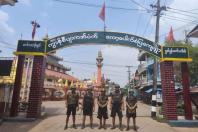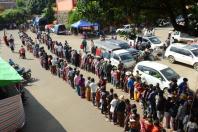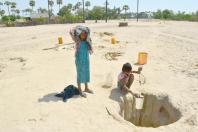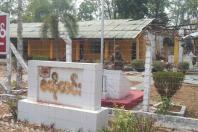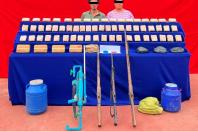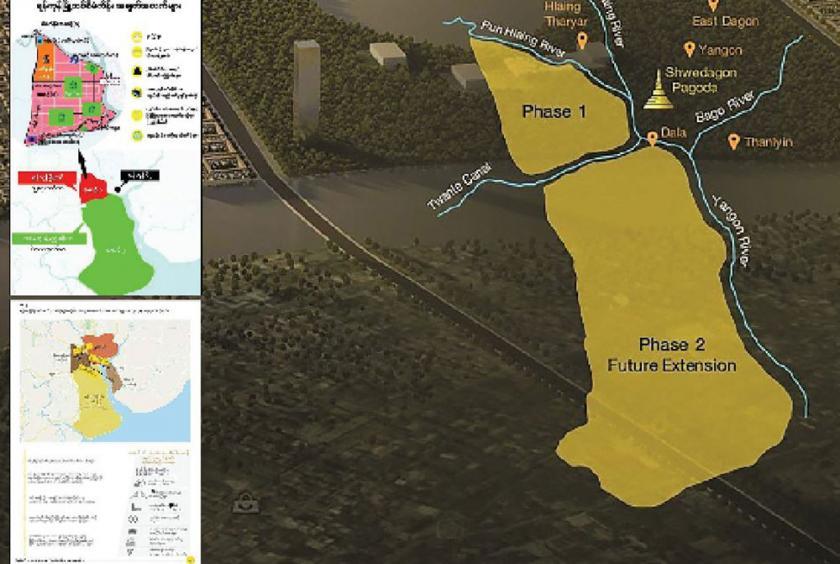
At the invitation of New Yangon Development Company (NYDC), I attended a talk about the NYDC Town Hall-2 held under the directive of Yangon Region Government on March 6. I was one of four panelists including the NYDC’s CEO U Thein Wai or Serge Pun, Chair of the Green Motherland Development Association U Win Myo Thu and Director of Sandhi Governance Institute U Khine Win.
I attended this event as the company said the questions can be raised. Another reason why I decided to attend this event is that there is no any discussion about the new Yangon city project at the parliament and anybody who will represent the voices of people.
Even though the event is aimed letting the people know about the project, journalist access is restricted. Is NYDC Town Hall aimed at sharing knowledge with the public?. The public have come to know the lack of transparency in the implementation of the new city project which is crucial for the country as there arises question of whether the NYDC wants the counts of similar events or not.
At the discussion, the NYDC’s CEO U Thein Wai said the new Yangon city project would create two million jobs. He wanted international companies to compete in the tender for the project. But there were no apart from China. The 13 per cent was not the bank interest rate. It is a 13-per-cent internal rate of return only.
In the time of former Yangon Region Chief Minister U Myint Swe in 2014, he sent a message to the region parliament on the development of the new Yangon city project. The region government selected Myanma Saytanar Myothit Public Company to develop the project on a 30,000-acre land.
The people came to know the fact that the project was backed by Chinese businessmen. The project was criticized by members of parliament on the grounds that it would undermine the country’s sovereignty due to money laundering, land price manipulation, the lack of transparency, the green-light given to a single company without any tender process and the involvement of Chinese businessmen behind the curtain. State Counsellor Daw Aung San Suu Kyi was one of the persons who criticized the project. She criticized that granting the permit to the single company for the project without any tender process showed the lack of transparency and contradicted the pledge made by the U Thein Sein administration at the beginning of office-taking. In the RFA’s regular radio program titled “Rocky Road to Democracy and Daw Aung San Suu Kyi”, she said, “Since taking office, the government is talking about the fact that good governance is transparency and responsibility. Has the government got rid of this concept if there is no transparency?”
The then-region government chose three companies for the project, namely Yangon South West Region Development Public Company, Business Capital City Development Company and Shwe Poppa International Construction Company as the project faced widespread criticism over China’s backstage involvement. The project was temporarily suspended during the transitional period. In the time of Yangon Region Chief Minister U Phyo Min Thein, the region government established New Yangon Development Company and signed the framework agreement with Chinese government-owned China Communications Construction Company Ltd (CCCC) after the removal of three above-mentioned companies.
I raised a question why those who criticized the previous government led by President U Thein Sein, for the lack of transparency, selected the CCCC without any tender process.
The CCCC has a close relation with the NYDC’s CEO U Thein Wai. When questioned about the permit granted to a single company without any tender process, U Thein Wai replied that he had no close relation with the CCCC. That company was involved since the time of the previous government.
Former Yangon Chief Minister U Myint Swe gave the nod to Myanma Saytanar Myothit Public Company for the new Yangon City Project without the invitation of tender. At the beginning of this project, the question was raised about the country’s sovereignty due to the involvement of Chinese companies and businesspersons behind the curtain. According to U Thein Wai’s discussion, we have come to know the dishonest involvement of Chinese government-owned CCCC in the project. It also shows that the CCCC would certainly implement the project anyway. It is interesting why the current government selected the CCCC for the project. The Yangon Region Government which leads the project would certainly know the involvement of CCCC if U Thein Wai himself has already known it. The Yangon Region Government needs to reply to the question of why the region government gave the nod to the CCCC for the project and whether it may undermine the country’s sovereignty or not.
U Theim Wai denied the speculations that CCCC has been handed the city project and the company, which will win in NYDC Challenge, will be handed.
It has been pointed out that although the project is handed to the CCCC without inviting tender and the company will be compete through the NYDC Challenge, it will be handed to the CCCC.
It is because leaders from both countries agreed to participate in “Belt and Road Initiative”, which is a strategy for China, and Myanmar also signed the MoU to involve in China-Myanmar economic corridor which is a part of “Silk Road Economic Belt”. The project is based on Mandalay to connect between Kyaukphyu and new Yangon City. Although the NYDC Challenge is made, any applicant cannot compete the CCCC in the challenge and it will be won by the CCCC at the end.
On the other hand, the CCCC, which involved from the behind to win the project in dishonest ways, will not lose the opportunity. If we look at the image of the CCCC internationally, it was blacklisted due to dishonest ways and freed in 2017. The time when the company was blacklisted is coincidence with the start of Yangon City project and the move from behind. Officials from the previous government era and present government should explain the public why they chose the company on a blacklist. U Theim Wai said he will take responsibility of the CCCC. However the project is not planned to develop on the land space owned by him. It will be implemented on 168,000 acres of land space located in sea mouth, which is strategically important for Myanmar, owned by the state.
On the other hand, the influence of China in the project is creating the condition to encroach on the sovereignty of Myanmar and the anti-corruption commission (ACC) should investigate why the CCCC was being chosen and who chose the company to protect the encroachment on the sovereignty of Myanmar. The ACC should also investigate whether the corruption issue is involved in the project or not.
A doubtful situation is also seen in concerned with the CCCC. The project is not submitted and discussed in the parliament.
Yangon Region Chief Minister Phyo Min Thein said the project was approved by the former parliament in previous government era. However the project is not set as priority in the master plan of Japan International Cooperation Agency (JICA) and three companies which were chosen by the previous government are removed. The project needs to submit to the parliament as it is questionable that the project can encroach on the sovereignty of Myanmar. It is also needed to ask the opinion of the public.
The project is continued to implement with the desire of the government alone and if all people will be against the project in the future, it will be undecidedly like Myitsone dam project. The country and its people will be suffered and the government in that time will have to take responsibility to deal the situation. The dam project is connected with 70 per cent of land in Myanmar and it is important for the country. New Yangon City project is also important geologically and politically for the country and it should be discussed in the parliament as it will be encroached on the sovereignty of Myanmar.
The project needs to submit to the regional parliament as well as the union parliament. It is because the project was estimated to cost up to US$5 billion roughly and the first phase of the investment can cost up to US$1.68 billion. According to the existing law, state and regional governments have authority to allow up to US$5 million only and it is clearly seen that the regional government is overstepping its authority as the project can cost up to US$5 billion. It is needed to ask questions at the union parliament and regional parliament why the regional government didn’t submit the project in the parliament and why they chose the CCCC and made the NYDC Challenge.
Both keeping silent and just merely observing will not do for this move that will see hundreds of thousands of acres of strategically placed state owned lands are to fall into the hands of a company like CCCC with a tarnished name. This is also partly due to what NYDC's CEO U Theim Wai had said.
He said that the company with the rights to the New Yangon City Development Project will earn money when managing water distribution and wastewater treatment, selling away land plots for industrial zones and when housing units are being built. As to the question of collecting fees, U Theim Wai had said that either CCCC or the joint venture company that will be formed with the NYDC Challenge winner company when probed whether it will be led by Yangon's municipality or a new one.
Here we have to consider whether this is now in almost exactly the same vein as the port city project in Sri Lanka, also helmed by the CCCC, albeit under its subsidiary of China Harbor Engineering Company - CHEC. In order to build the Colombo Port City, the CHEC had set up a Project Company - PC. It will be bearing all the costs for land reclamation by digging up the earth from the Indian Ocean to be filled along Sri Lanka's coast for a total of 233 hectares. Out of those, the PC will be getting the most favorable and marketable 108 hectares while the rest of not so strategically sound land will go to Sri Lanka. Out of the 10 hectares, 20 hectares will be freehold land while the rest of the 88 hectares will be under control of the CHEC for a total of 134 years. Almost half of the land involved in that project looks to be owned by the PC, and by extension the CHEC. The Colombo Port City is an integral part of China's Belt and Road Initiative, just as the new Yangon City Development Project is. It began in September, 2014 and has since finished the map layout, blueprints and some foundation works. The Colombo Port City is expected to take around 25 years to complete with a budget of 15 billion dollars. Sri Lankans are now worried that this will be a repeat of the Hanbantota Port, given out to Chinese control due to a debt trap and greatly jeopardizing their national sovereignty.
Despite such a foreboding example of Sri Lanka, Myanmar had failed not only to take heed but looks to control the new Yangon City through the joint venture company. It needs to be considered then how much do we really need a project that will result in a city that will either be controlled by China's CCCC, or any other country for that matter.
If a winner company of NYDC Challenge or CCCC or NYDC is to rule the new Yangon city under a new civil law by establishing a JV company, the CCCC really has to control the city because it is the largest shareholder. U Thein Wai said that a joint venture company would be established with the CCCC or the company that won the NYDC Challenge. His company will invest US$1,680. The rate even period is 15 years by calculating IRR 13 percent. The total period is 30 years. During the period, the CCCC will be taking IRR 13 percent. Myanmar will receive just 5 percent while the CCCC has the chance to earn 95 percent of the income. When IRR 13 percent has been settled, Myanmar will earn 25 percent and the CCCC (the winner company) 75 percent.
It is unfair if they get back both US$1,680 million IRR 13 percent while Myanmar that has to grant a vast area of land will continue to earn 25 percent. The CCCC (the winner company) that will earn up to 75 percent will have control of the new Yangon city's territory by paling the major role in the new city authority organization.
What we are sure is that Myanmar does not need a new Yangon city that will be controlled by the CCCC or any foreign company. Such a project needs to be completely stopped now. It is necessary to resume the project only after public consent and parliamentary debate and when Myanmar's sovereignty is deemed unharmed.
U Thein Wai highlighted the dream of seeing more foreign investments when he estimated two million jobs in relation to the US$1680 million and IRR 13 percent.
He pointed out sale of industrial land areas and the appointment of a large number of workers in the zone as well as the new city's chance to receive income and profits from three out of six tasks to be implemented by the CCCC.
In this context, we could see U Thein Wai talk about his ideas without considering the Myanmar situation. In Myanmar with a sad face in the international community due to the Rakhine issue, foreign investment has been declining since the NLD government took power. At a time when the situation now is not as good as that in the time of U Thein Sein, there is no way to see the return of US$1,680 million in investment and IRR 13 percent if no foreign investment flows to the new city project.
Since the JV company will get little, one acre of land may be priced at K300 million to K500 million or K600 million. With little progress, few Myanmar citizens will come to buy land in the new city.
Without factories and land purchases, the rate even period cannot be 15 years, forcing the city to become a ghost city. What's more, if US$1,680 million plus IRR 13 percent could not received, the prescribed profit sharing rate in which Myanmar earns 5 percent and the CCCC 95 percent will remain unchanged for many decades.
U Thein Wai also talked about two million jobs. He considered only the workers coming to the factories. Chinese companies are found to have appointed Chinese citizens even to fill the posts of driver or generator operator.
I pointed out the cancelled provision of the Myanmar Investment Law that 75 percent of the workforce shall be entitled to Myanmar workers and the absence of laws that can control foreign workers. As Myanmar citizens have very few chances to work in the new Yangon city project due to the participation in the ASEAN Economic Community in 2020, two million jobs U Thein Wai have talked about is totally impossible.
There can also be other worse situations. There may be hundreds of thousands of squatters as no housing project is found for zone workers in the industrial zone said to be built in the new city. If there are about 5,000 workers in establishing an industrial zone, the number may reach 20,000 if we calculate about four people in one household.
Yangon has repeatedly seen the rise of industrial zones and with them the increase in squatters as not one of them could accommodate for all the workers. U Theim Wai's new Yangon city development project with around one hundred thousand workforce will likely bring up the squatters to around 500,000.
If those numbers swell up together with Yangon's extant squatter households of around 150,000(approximately 500,000 squatters), Yangon's squatter count will breach the million mark. It will turn rather disappointing when the prospect of two million job opportunities attract all these people but do not account for the possibility of squatters.
Furthermore, not only did U Theim Wai waved around the impossible dream of two million jobs, he also claimed that all in Yangon with jobs will be able to live in the New Yangon City. For that, U Win Myo Thu, Chairman of Sein Lan Ami Myay Development Organisation said that it will cost Ks 5,000 Lakhs per acre to be able to live there. He pointed out that people of Yangon didn't need an entirely new Yangon but actually affordable housing, pointing out that City Loft affordable housing project by the FMI is far out of reach even for salary earners of Ks 10 Lakhs per month. Per unit of housing, going for around 750 Lakhs, cannot be paid off in installments so going to Yoma Bank's loan scheme and paying back in 25 years will bring the total to over Ks1,000 Lakhs. If the new Yangon City, with a capacity of around 3 million, were to be built to accommodate for Yangon's future population of around 10 million, most of the people will not be those that can actually afford it but migrant workers from across the nation that were destitute.
As for me, my chance at getting to participate in the discussion held at the NYDC Town Hall 2 left me primarily with five negative points that to me was akin to selling off your own daughter to a wealthy man to have a little bit of financial respite.
They are;
1) Allowing a rather infamous company like CCCC the rights not through a tender process but through a Framework Agreement
2) the risk it poses to national sovereignty as a wholly foreign owned company will have majority of the rights and access to the control of the New Yangon City, including its own rules and regulations
3) the current tarnished image of Myanmar looking as if it will languish with only a 5% for decades upon decades as the lack of FDI would mean paying back 1.680 billion dollars with 13% IRR impossible.
4) lack of foresight for more squatter problems that will inevitably come with the 2 million job opportunities for the New Yangon City Development Project on top of current failure to address squatter housing problem
5) forcing this city development project that will not be practical for the people due to lack of affordable housing with it looking like it will be a luxurious ghost city inhabited by few and far between.
The current situation for the city development project is one that should not be go ahead with as the country stands to lose swathes of state owned lands for the cheap while posing a risk to our nation's sovereignty. I would like to encourage the union parliament to discuss and decide how much exactly will this project benefit the country and the people at this point in time where the financial prospect looks bleak and stands to lose around 168,000 acres of land for the cheap.


